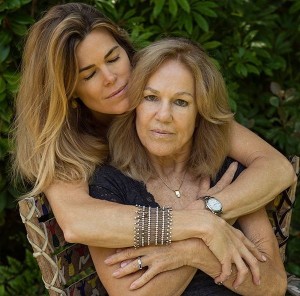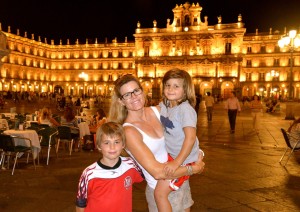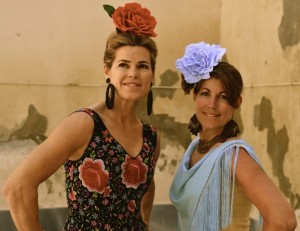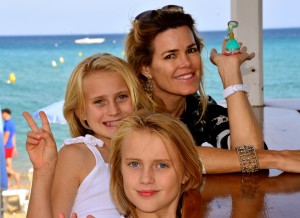(This article is a part of our series on Inspiring Stories and is a gracious contribution by Suzanne Rico from SuzanneRico.com. Please contact me if you have a great story to share with our fine parents community!)
When the wind blows from the east in the town where I live in Southern Spain—called a Levante—and the tide from the Bay of Cadiz pushes back up the Rio Guadalete, the strong smell of sewer wafts from our bathroom’s ancient pipes. Since this is a windy area and our apartment is small, I bark at my children if they leave the door ajar and then feel guilty about my bad mood; they have done a better job at adjusting to living in a place that smells like crap than I have.
 We moved to Spain last summer after my mom died from cancer. It was an impulsive decision, spurred by a grief so great I felt I had no choice but to try to outrun it. My husband understood that the memories in every corner of our house in Los Angeles–where we had brought my mom to live when she got sick–were salt on an open wound and went along willingly. But our two boys, who were five and seven years old at the time, didn’t have a choice.
We moved to Spain last summer after my mom died from cancer. It was an impulsive decision, spurred by a grief so great I felt I had no choice but to try to outrun it. My husband understood that the memories in every corner of our house in Los Angeles–where we had brought my mom to live when she got sick–were salt on an open wound and went along willingly. But our two boys, who were five and seven years old at the time, didn’t have a choice.
We moved from our large, comfortable suburban home into a faded but still grand Spanish palacio in the middle of an old port town famous for being the place where Christopher Columbus once sailed for the Americas. My sister Stephanie had moved there two years earlier with her two pre-teen daughters and husband, a surgeon for the U.S. Navy, and had managed to secure for use the last bit of space in her building—a small, charming cluster of rooms with no kitchen and only a half bath.
 Overnight, the impact of our decision took on a physical form: dinner time meant eight of us gathered around the table in my sister’s side of the palacio; I could no longer understand the supermarket cashier; and outside my window loomed a medieval castle with a huge stork’s nest in the turret. I had never even seen a stork much less lived next to a castle. This all felt enchanting and a little bit scary at the same time.
Overnight, the impact of our decision took on a physical form: dinner time meant eight of us gathered around the table in my sister’s side of the palacio; I could no longer understand the supermarket cashier; and outside my window loomed a medieval castle with a huge stork’s nest in the turret. I had never even seen a stork much less lived next to a castle. This all felt enchanting and a little bit scary at the same time.
We enrolled our kids at the same small, bare bones Spanish school their cousins attended —a mustard-yellow, four-story building in the town center. Recess was held on the school’s rooftop, an empty swath of red-painted concrete that left rust colored stains on my kid’s pants with not an inch of green space in sight. High, whitewashed walls kept the students from plummeting into the cobbled street below and a growling air-raid siren signaled the end of playtime. A row of small, outdoor urinals—the roof’s only adornment—added to the vaguely prison-like feel.
“Does anyone use them?” I asked Griffin one day when I went to volunteer at school.
“I did,” he replied, blushing. “Just once.” Then he ran off to play soccer with his amigos, who were kicking a crumpled piece of tin foil that served as the ball.
 At first it was difficult to keep the worry that my decision to drag my family half way around the world was a bad one from stealing my peace of mind. I wondered what kind of a mother would put her own needs and feelings before those of her children? After the trauma of losing their grandmother, I was expecting two small souls to adjust to an entirely new way of life without lasting damage. When my five-year old Adrian came home crying from school twice in the first week, I felt sick with guilt.
At first it was difficult to keep the worry that my decision to drag my family half way around the world was a bad one from stealing my peace of mind. I wondered what kind of a mother would put her own needs and feelings before those of her children? After the trauma of losing their grandmother, I was expecting two small souls to adjust to an entirely new way of life without lasting damage. When my five-year old Adrian came home crying from school twice in the first week, I felt sick with guilt.
“Mommy,” he sobbed, “my teacher yells all the time.” Tia, my 11-year-old niece, tried to comfort him. “Most of the time, they’re just joking,” she said. Joking? “You’ll get used to it,” she added, matter-of-fact. And he did. Both Adrian and Griffin have adjusted to Spanish school better than I’d ever hoped, getting excellent grades and assimilating with ease. They also love the Spanish food, their Spanish friends, and the laid-back Spanish lifestyle, which lets them stay up ridiculously late on weekends.
But more than the cultural exposure (after eight months both now speak beautiful Spanish) living together with their aunt, uncle, and cousins has been a gift that has changed all our lives for the better. My sister, who taught in inner-city high-schools before moving to Spain three years ago, has helped us all understand how to better navigate disagreements. Frankly, during my mother’s nine-month-long cancer fight–and the aftermath of her death–I’d abdicated my parental responsibility to a large extent, often choosing the easiest way out of an argument instead of the best way. But in those first months in Spain, while allowing myself the sweet release of ignoring the fact that I am now an orphan (my father died from cancer when I was 26), I re-learned the art of listening to my children and began to take the time to actively help them work out their fights. In the strange adjustment period of blending two families into one, we all began to appreciate more the value of the words, “I’m sorry.”
“I’m sorry for speaking to you in a bad tone,” says one child, a mantra we adults work on consistently and try to model as often as possible. “It’s ok,” responds the other, “I forgive you.” And as sure as the everyday miracle of a red Spanish sunset over the Bay of Cadiz, these words short-circuit the conflicts that used to make me crazy.
 Parenting has become a group affair. Early on, we decided that each adult should have the power to discipline each child and when one of our children chooses poorly—fails to complete their daily chore, for instance, or talks back–instead of yelling at them, the adult in charge gives them a consequence for their action. And while it was difficult to get used to having my sister and her husband discipline my children, the result is that our communal household is a calmer, kinder place.
Parenting has become a group affair. Early on, we decided that each adult should have the power to discipline each child and when one of our children chooses poorly—fails to complete their daily chore, for instance, or talks back–instead of yelling at them, the adult in charge gives them a consequence for their action. And while it was difficult to get used to having my sister and her husband discipline my children, the result is that our communal household is a calmer, kinder place.
“I love you too much to allow you to act like that,” Stephanie said to Griffin one day, after learning from his teacher that she had to put him in a time-out for clowning around in class. She ordered him to pull twenty weeds in our dusty car park as a consequence and then followed his thin, glum form outside to work along side him in the sweltering head of a Southern Spanish afternoon. Within seconds they were in a deep discussion about Queen Isabella, the Napoleonic Wars, and an ancient named King Alfonso El Sabio (Alfonso The Wise).
Also at my sister’s suggestion, we cut the boys’ electronics time from an hour a day to an hour a month. This seemed radical at first–for them and for my husband and me, as tablets and smart phones make handy babysitters. But my sister’s theory that social interaction is more important than parental relaxation (or high scores on Minecraft) made sense. And while I was sure this particular culture shock would send the kids into open revolt, they simply began filling their free time by roller-blading in the tiled courtyard or playing rowdy games of Monopoly with their cousins. My older son’s behavioral issues—stormy moods and outbursts I’d suspected might be linked to screen time—lessened.
 I am a woman who believes that things happen for a reason. But for a long time after my mother died, I could not see how any good could come from her cruel illness and death. I picked around in the experience, searching for the scar’s silver lining, but found only horror, pain, and disbelief. These days, however, when I see a stork take off from its castle nest, white and black against blue sky, or hear the keening, lovely wail of gypsies singing Flamenco in the street, a spark of clarity flares: sometimes, just when we think we are running from something, it turns out we are really running toward exactly what we need.
I am a woman who believes that things happen for a reason. But for a long time after my mother died, I could not see how any good could come from her cruel illness and death. I picked around in the experience, searching for the scar’s silver lining, but found only horror, pain, and disbelief. These days, however, when I see a stork take off from its castle nest, white and black against blue sky, or hear the keening, lovely wail of gypsies singing Flamenco in the street, a spark of clarity flares: sometimes, just when we think we are running from something, it turns out we are really running toward exactly what we need.
The loss of my mother left a hole in my heart, but it did not leave a vacuum. Instead it created something new—a definition of family that would never have occurred if she had lived to a wonderful old age. And while I could have muddled through the shock and grief of loss if I had stayed in Los Angeles, moving to Spain to be with my sister and her family has allowed me to flourish, opening to life’s challenges and joys like one of the exhuberant sunflowers that dot the rolling hills of Andalucia. I’ve gained new perspective on what it means to be a family—and most of all how to be a better mother. And if living with a really small, really smelly bathroom is the sacrifice I have to make for that, I’m more than willing to pay the price.
 : Suzanne Rico is a writer who spent many years as a television news anchor and reporter. She blogs about parenting, aging well, and travel at SuzanneRico.com and her most recent feature article, “All Together Now” appeared in the April, 2014 issue of O, The Oprah Magazine. Suzanne is currently working on a book project in addition to her most important job of being a mom.
: Suzanne Rico is a writer who spent many years as a television news anchor and reporter. She blogs about parenting, aging well, and travel at SuzanneRico.com and her most recent feature article, “All Together Now” appeared in the April, 2014 issue of O, The Oprah Magazine. Suzanne is currently working on a book project in addition to her most important job of being a mom.
Nice answers in return of this query with real arguments and explaining all about that
Thanks for any other informative web site.Where else may I get that kind of information written in such ann ideal means?
I’ve a mission that I am just now working on, and I have
been at the look out for such information.
Look into my page … how much to advertise on tv (Lucy)
Wonderful story with a beautiful end, kudos to both the husbands and a wonderful sister.
You’re right Masuma Aunty… it’s amazing that everybody in the family, including the little kids, pulled their weight to make something wonderful out of an otherwise sad situation!
I really need a sister who lives in Spain 🙂
Great article. So glad you found your blessing in disguise of a tragedy.
LOL Janel, so true! You could be that sister, you know 😉
Good, many things to learn from this article
I totally agree with you, Suma! I’m so glad Suzanne decided to share this story with us…